Team
POSTDOCS
30167 Hannover
PhD students
30167 Hannover
30167 Hannover
M. Sc. Jan Richter (at PTB Braunschweig), jan.richter@ptb.de
Master students
- B.Sc. Finn Feuerstake on interference effects in di-Higgs production
- B.Sc. Althea Cappelli (jointly supervised with Prof. Dr. Klemens Hammerer) on axion and Gravitational Wave searches with cavities
- B.Sc. Prithvi Timalsina on Electric Dipole Moments in an Effective Field Theory approach
- B.Sc. Apostolos Tsabodimos on CP violation for electroweak baryogenesis
- B.Sc. Vincent Riechers on sensitivity to CP violation in Higgs couplings at the FCC-ee
Former members
Bachelor students
- Marc Hannig, B.Sc. thesis 10/2022 - 03/2023 on "Enhancing the sensitivity to CP violation in the Higgs-top interaction with machine learning". Still collaborating on the overall paper on the CP structure of the effective Higgs-gluon-gluon coupling via gluon fusion into Higgs + 2 jets. Next: M.Sc. at LUH since 04/2024, summer student at DESY Hamburg, summer 2023.
Join us
Motivated and talented students, PhD students and postdocs are very welcome to join me and my new group in the quest for particles and phenomena beyond the Standard Model. Please contact me if you are interested in a Bachelor, Master, PhD thesis, a postdoc or a research visit in my group.
My junior professorship started in June 2021 and I am now building a dynamic research team. Until July 2023, I will be based at CERN (on leave of absence from LUH and PTB), and PhD students and postdocs from my team can also come to CERN for a research visit before the group will be centered in Hannover/Braunschweig from summer 2023 on.
Three PhD students and a postdoc started this year. Currently, no further PhD or postdoc positions are available, but it is possible to apply for externally funded fellowships. Bachelor and master students are welcome to join at any time, however, until summer 2023 the supervision would be remote apart from occasional in-person meetings in Hannover. No additional M.Sc. theses are available during the current winter semester 22/23.
As an alumna of the Studienstiftung des deutschen Volkes, the Minerva Foundation and the Humboldt Foundation, I will be happy to support fellowship applications of qualified candidates for these or other fellowships, e.g.
- International researchers (with a PhD or equivalent by the start of the program) are invited to apply for a Humboldt Research Fellowship of the Alexander von Humboldt Foundation for 2 years (postdocs) or up to 1.5 years (experienced researchers).
- Ukrainian researchers are very welcome to join! The Alexander von Humboldt Foundation supports researchers at risk with Philipp Schwartz Fellowships https://humboldt-foundation.de/en/apply/sponsorship-programmes/philipp-schwartz-initiative in Germany for 2-3 years.
- Israeli Master and PhD students as well as postdocs are in addition invited to apply for the Minerva Fellowship for up to 3 years (PhD students) or 2 years (postdocs), or a Minerva Short-Term Research Grant. !ברוכים הבאים
- Master students of all nationalities looking for PhD funding are invited to apply for a doctoral scholarship of the Studienstiftung or other suitable foundations (e.g. Begabtenförderungswerke) according to their strengths and extracurricular interests.
I explicitly welcome applications from students and scientists of all nationalities, genders and cultural backgrounds.
News
- This November has been intense: on 21.11.2023, I gave my inaugural lecture (Antrittsvorlesung) in the colloquium of the Department of Mathematics and Physics. Thanks to the department for also inviting the junior professors to give such a lecture.
- 14.11.2023: I had the pleasure to speak at the KinderUni opening, together with our Minister of Science and Culture of Lower Saxony, Falko Mohrs, and three actors. See the "Outreach" section for details.
- 16.10.2023: I thank the German Science Foundation (DFG) for the wonderful award ceremony of the Heinz Maier-Leibnitz Prize, and of course for the big prize. Many thanks to the committee for going through 171 nominations and selecting 9 other young scientists and me, and in particular to Prof. Holger Gies for this kind laudatio (also as video/photo collage). You can find impressions from the ceremony on here, including the video and photos. It was very nice to meet also the other laureates and here about their impressive research.
- 29.09.2023: Apostolos Tsabodimos joined our group for a master thesis on electroweak baryogenesis. Vincent Riechers is going to join us soon for a master project on Higgs physics at the FCC. Welcome to both!
- 28.08.2023: Our work on atomic techniques for the detection of high-frequency gravitational waves in collaboration with Valerie Domcke, Joachim Kopp and Torsten Bringmann at CERN has been accepted as a Letter in PRD. The astrophysics blog 'astrobites' highlighted our work paper of the day.
- 27.06.2023: I am delighted to announce that the DFG Hauptausschuss decided to award this year's Heinz Maier-Leibnitz Prize to me, the highest German award for outstanding early career researchers (like junior professors or young investigator group leaders) who have established their independent research profile, but do not have a permanent position. The other 9 price recipients of this year come e.g. from the fields of history, cryptography, and physical chemistry, and I look forward to meeting them at the award ceremony in Berlin in October. I thank the DFG for the high recognition of my work and the LUH for nominating me! For more information, see the posts on Twitter by the DFG and the LUH, and the press statement by the LUH and the Ministry of Science and Education of Lower Saxony here and by the city of Hannover here.
- 29.05. - 03.06.2023: 17 master students from LUH will come to CERN for an intense 1-week block lecture on Particle Physics beyond the Standard Model, with a program full of lectures, exercise sessions and visits of several CERN experiments including the ATLAS control room, the Antimatter Decelerator and the CERN Accelerator Control Center. For impressions from the BSM block lecture at CERN last year, please see the Teaching section.
- 17.04.2023: Prithvi Timalsina started his project on Electric Dipole Moments as a low-energy precision test of CP violation beyond the Standard Model in an Effective Field Theory framework. Welcome to the group!
- 28.03.2023: Marc Hannig completed his successful bachelor thesis and won a place in the competitive DESY summer student program, congratulations!
- news from the winter and spring: Agnese, Jan and Marco won scholarships of the LUH Graduate Academy for a research stay abroad or trips to conferences. Congratulations!
- 21.09. - 05.12.2022: This fall also included exciting outreach events. It was a big honor for me to give the final lecture in the series "7 adventures" on the 7 millenium problems of mathematics. My lecture on the physics view on "Young Mills theories: existence and mass gap" was hosted by the Junge Akademie and took place in the Berlin-Brandenburg Academy of the Sciences and Humanities - what a nice location! For the new CERN exhibition "Science Gateway", I was filmed to explain concepts like the vacuum and black holes in German. Another filming will be about "Exploring the Unknown". More details are available in the Outreach section below.
- 1.-4.11.2022: The CERN Quantum Technology Initiative moved a big step forward with our International Conference on Quantum Technologies for High-Energy Physics (QT4HEP) in CERN's main auditorium which attracted 250 participants from leading institutes of particle physics, quantum computing and quantum sensing, as well as from industry. Several participants from LUH and PTB also gave a talk.
- 1.11.2022: wonderful to welcome Fiona and Agnese to CERN and have at least a part of the group around for in-person interactions! Agnese will stay for the fall and Fiona until next summer before the whole group will be located in Hannover and Braunschweig.
- 26.09. - 29.11.2022: The fall was full of trips to interactive workshops. In September, I gave a talk at the Trapped Charged Particles (TCP2022) Conference in Glashütten, and participated as a member of the organizing committee in the DESY Theory Workshop focused on "Higgs, Flavor and Beyond". In October, it was great to see many experts of quantum sensing from around the world in Hannover at the conference on ”Quantum sensors and tests of new physics” (QSNP). Fiona and Jan presented posters there and I gave a talk. In November, I gave talks at the ”Quantum Systems in Extreme Conditions“ (QSEC2022) conference in Bingen, the CERN Theory retreat in Les Houches, and at the LHC Higgs Working Group workshop at CERN. At the simultaneous Helmholtz Alliance Workshop "Physics at the Terascale", Marco presented our first results of a Machine Learning-based approach to enhance the sensitivity of the LHC to the CP structure in the effective Higgs-gluon coupling.
- 10.10.2022: With the start of the fall semester, also my Quantum Field Theory lecture started. So many students participate such that we had to bring in more chairs into the lecture room.
- Oct 2022: The Leibniz University Hannover nominated me for the Heinz Maier-Leibnitz Award for outstanding young scientists with an independent research profile who are on a fixed-term position. Thank you very much for the nomination! Now I hope to pass the selection process by the DFG.
- 01.10.2022: Welcome to Marc Hannig as the first bachelor student of the group! He will work on the effective Higgs-gluon-gluon interaction via ggF -> H+2jets and how to enhance the sensitivity to the CP structure of this interaction in the kinematic region where the signal process of gluon fusion looks like the background process of vector boson fusion.
- 15.09.2022: Althea Cappelli will work on a master thesis on particle physics and quantum information theory jointly supervised by Prof. Tobias Osborne and me, starting in the winter term. Welcome in the group!
- 16.08.2022 Finn Feuerstake and Marc Hannig are joining our group for their master and bachelor theses, respectively, starting in the winter semester. Welcome to the team!
- 8.-12.8.2022: It was a a huge pleasure to welcome 20 students from LUH and 2 external participants to CERN for a lively week of a compact block lecture on Particle Physics Beyond the Standard Model - including lectures, exercises, a guided tour and a hands-on workshop where we built our own cloud chambers!
- In August 2022, I was appointed as the Theory Coordinator of the CERN Quantum Technology Initiative (QTI) to strengthen the collaboration in quantum sensing, computing and theory between CERN as a European hub and institutes in its member states (including Germany and therefore the LUH & PTB), and to initiate new scientific collaborations. I look forward to the intense exchange of ideas and contributing to this European network. This new task extends my stay at CERN such that I will move to Hannover in the summer of 2023.
- 12.07.2022: It was a pleasure to join the lunch meeting organized by the LUH Graduate Academy on combining working in academia and having a family, to share my own experiences and hear from others.
- 15.-17.06.2022: Wonderful to meet the Higgs & EFT community in person at the HEFT2022 conference in Granada, Spain. I gave a talk on electroweak baryogenesis in SMEFT. It was my first flight after over a year and will remain my only flight this year. Apart from that, I travel by train, also long distances, and work in the train.
- 09.-13.05.2022: It was exciting to attend the Heraeus Seminar at Bad Honnef on High-precision measurements and searches for New Physics where Jan presented a poster and I gave a talk. How nice to meet the community in person after a long time of online meetings.
- 24.03.2022 Marco presented our work at the DPG spring meeting of particle physics.
- 17.03.2022: Jan presented his paper on parity violation with partially stripped ions at the DPG spring meeting of atomic physics.
- 16.03.2022: I was glad to join for the first time the DPG spring meeting (even if online) of the atomic section by giving an invited talk on Searching for physics beyond the Standard Model with isotope shift spectroscopy.
- 15.03.2022: Agnese Mariotti had her first day of work as a PhD student at LUH. Benvenuta! She graduated from Università Roma Tre with a master thesis on the Dark Matter relic density in gravitational portal scenarios. Her PhD position is funded by a generous donation from the ITP alumnus Dr. Marco Krohn to the LUH-ITP. Agnese won this position through the ITP-wide selection procedure. Congratulations!
- 25.02.2022: Marco's and my paper in collaboration with colleagues from DESY, UChicago, Madrid and Paris appeared on the arXiv: Constraining the CP structure of Higgs-fermion couplings
with a global LHC fit, the electron EDM and baryogenesis. - 02.02.2022: On his second day of work, Jan's paper on Parity-Violation Studies with Partially Stripped Ions got published. Congratulations!
- 01.02.2022: Jan Richter and Marco Menen had their first working day as PhD students at the FPM (Institut für Fundamentale Physik für Metrologie) at PTB. Congratulations and welcome to the team! Jan graduated from TU Braunschweig with a master thesis at PTB on parity violation in hydrogen-like ions. Marco graduated from Uni Köln with a master thesis at Uni Bonn on the CP structure of the Higgs-fermion couplings.
- 20.01.2022: Few days before the actual start of his contract, Marco presented our work on CP violation in Yukawa couplings in the LHC Higgs cross section CP working group meeting.
- 06.01.2022: Fiona Kirk, currently PhD student at PSI/Zurich, accepted a postdoc position in our group. Looking forward to welcoming you in the fall!
- 23.11.2022: At the 14th Annual Meeting of the Helmholtz Alliance “Physics at the Terascale”, I gave a talk on constraining CP violation in the Higgs Yukawa couplings.
Publikationen
CV
| since 06/2021 | Junior Professor at the Leibniz University of Hannover and PTB Braunschweig |
| in the Excellence Cluster QuantumFrontiers; member of the Science Board | |
| leader of the Topical Group "Testing Fundamental Physics with Spectroscopy" | |
| since 07/2022: member in the SFB DQmat | |
06/2021-08/2023 | Senior Research Fellow at CERN, Switzerland |
| 08/2022-08/2023: Theory coordinator of the CERN Quantum Technology Initiative | |
| 2019 - 2021 | Postdoc at Fermilab and the University of Chicago, USA; Feodor-Lynen Fellow |
| 2015 - 2019 | Postdoc at the Weizmann Institute of Science, Israel; Minerva Fellow |
| 2012 - 2015 | PhD (Dr. rer. nat.) at DESY/ University of Hamburg |
| 2014: 4-months research stay at CERN | |
| 2006 - 2012 | B.Sc. and M.Sc. at Georg-August University of Göttingen, M.Sc. thesis at DESY, Hamburg |
| 2011: 1-month research stay at University of California, Santa Cruz, USA | |
| 2009/2010: Erasmus at University of Helsinki, Finland |
Research Topics
- Higgs phenomenology beyond the Standard Model
- CP violation in the Higgs sector
- collider constraints on complex Higgs Yukawa couplings
- Machine Learning to enhance the sensitivity to a small CP admixture in the discovered Higgs boson
- electroweak baryogenesis
- electric dipole moments
- SM extended by a light (pseudo-)scalar
- searches for a light (pseudo-)scalar at the energy, intensity and precision frontiers
- relaxion-Higgs mixing
- naturalness
- exotic Higgs decays
- long-lived particles
- quasi-degenerate (pseudo-)scalars
- mixing and resonance effects
- interference effects
- development of precise approximations
- LHC bounds on heavy Higgs bosons
- sensitivity to BSM Higgs sectors at future colliders
- CP violation in the Higgs sector
- precision spectroscopy as a tool to search for new light particles
- isotope shifts to reduce nuclear uncertainties
- nonlinearity of King plots for heavy elements
- few-electron systems
- Rydberg states
- Highly charged ions
- plans: molecules, exotic atoms
- interpretation in models that are best tested by spectroscopy
- Dark Matter and mediators to Dark Sectors
- isotope shifts to reduce nuclear uncertainties
- high-frequency gravitational waves
- searches with atomic clocks
30167 Hannover
Lectures
-
Winter semester 2022/23: Quantum Field Theory
5 ECTS, 3 (L) + 1 (Ü) SWS with exercises, Monday 14-16 L, Friday 12-13 L, 13-14 Ü
Quantum Field Theory
The lecture will be hybrid: some lectures will take place in person at LUH. The remaining lectures will be online in the weeks when I am at CERN.
The online lectures are recorded and available on StudIP/Flowcasts.The lecture will be held in English. The homework and the exam will be accepted in German and in English.
The exam dates are
08.02.23, Großer Physikhörsaal (E214), 12:00-15:00 Uhr
04.04.23, Großer Physikhörsaal (E214), 13:00-16:00 UhrMore information on StudIP.
-
Summer semester 2022: Particle physics beyond the Standard Model (block lecture at CERN)
2 ECTS, 1 week lecture at CERN + 3 online exercise sessions
![]()
![]()
![]()
![]()
![]()
![]()
![]()
![]()
![]()
![]()
![]()
![]()
![]()
![]()
![]()
![]()
![]()
![]()
Why is the Standard Model of particle physics (SM) incomplete? Why is the Higgs mass much below the Planck scale? What could Dark Matter be? Where does the baryon asymmetry come from? After a review of the SM with a focus on its gauge groups and the Higgs mechanism of electroweak symmetry breaking, this lecture covers several extensions of the SM that address (some of) its shortcomings. In addition to the theoretical concepts, we also touch upon the detection strategies.
17 BSc/MSc students and 4 PhD students travelled to CERN in Geneva to attend this compact block lecture from 08 to 12/08. In addition to 21 teaching hours in presence including a daily exercise session, 3 online sessions take place after the excursion to address questions and discuss the solutions of the homework assignments.
During the week at CERN, a guided tour to the synchrocyclotron and the ATLAS control room, a hands-on workshop to build our own cloud chambers to detect traces of particles, visits to the on-site exhibitions Microcosm and World of Particles, and lunch discussions completed the program with practical experiences.
The excursion was generously supported by the with 6651€ from the study quality funds (SQM) of the ITP which fully funded the train tickets and 5 nights in the CERN hostel for the 17 BSc and MSc students.
Outreach
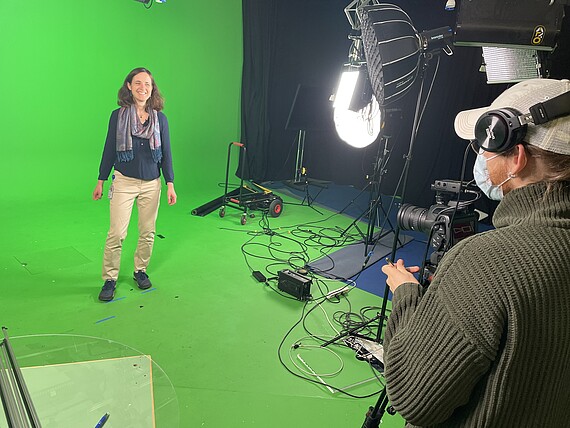
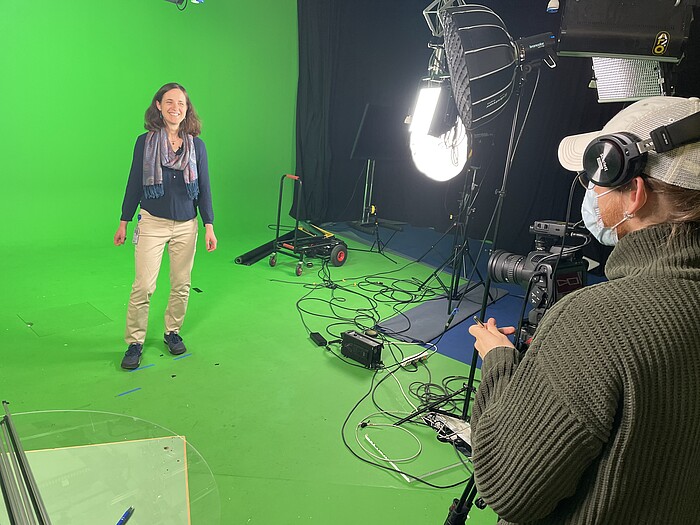
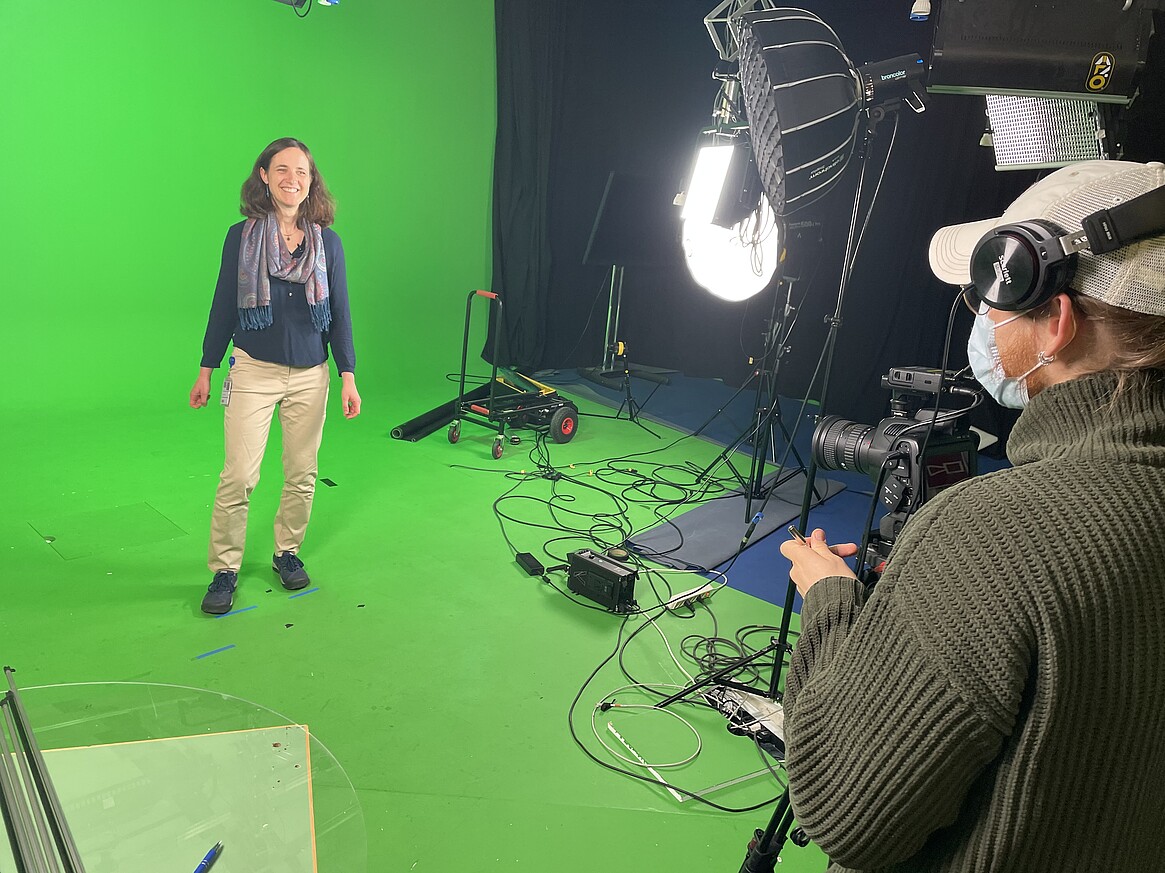
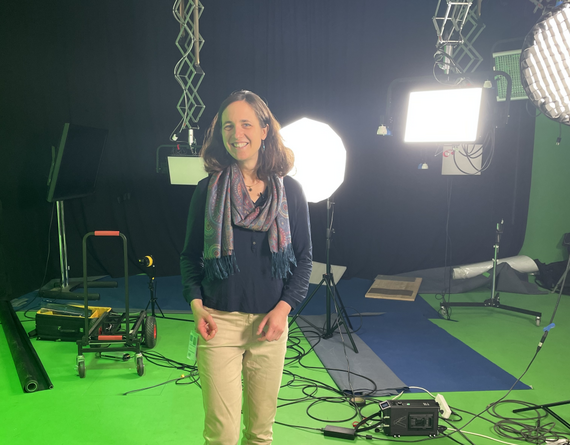
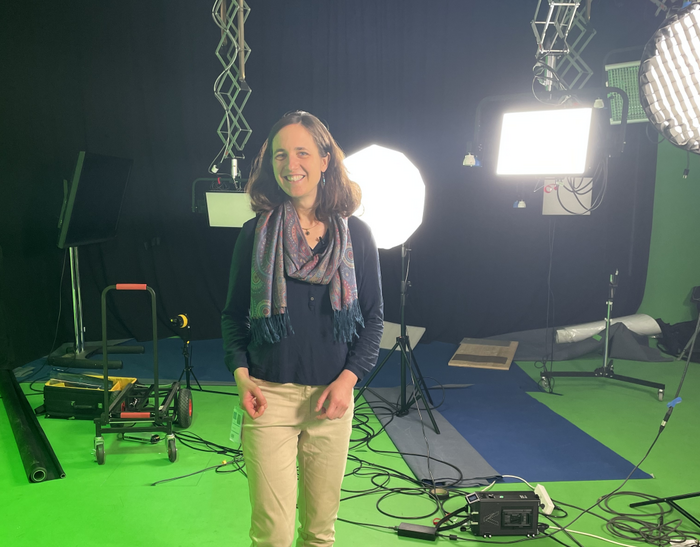
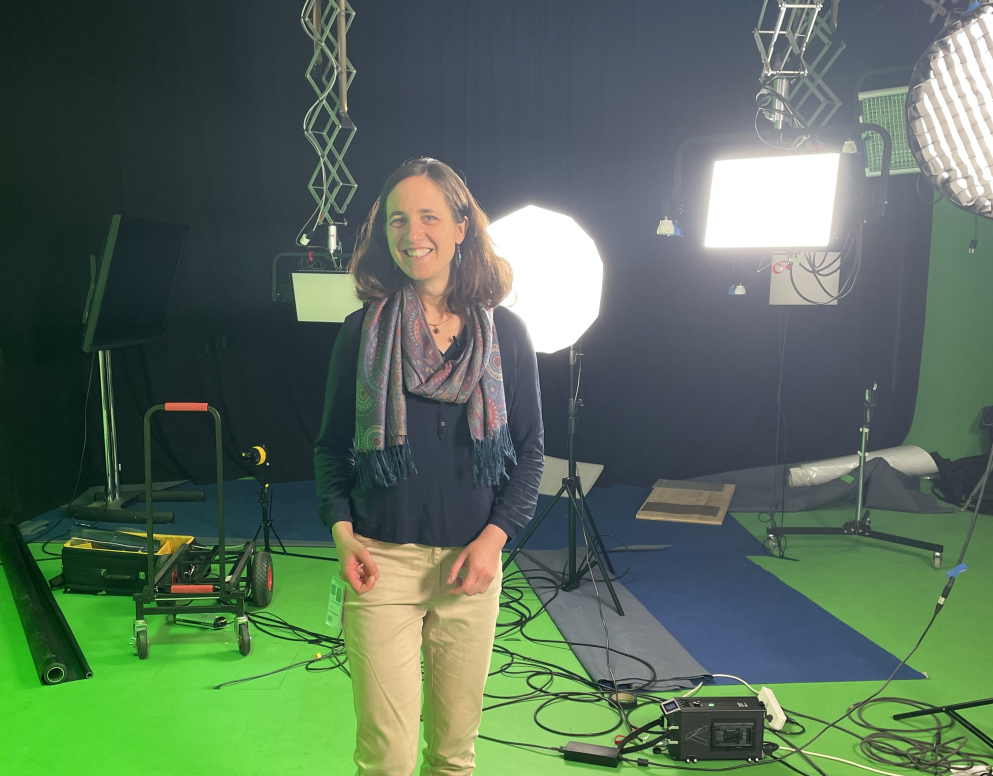
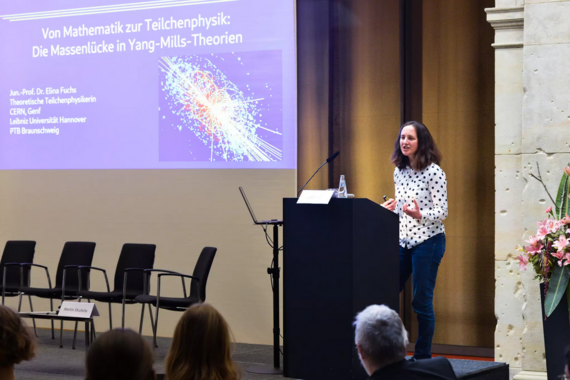

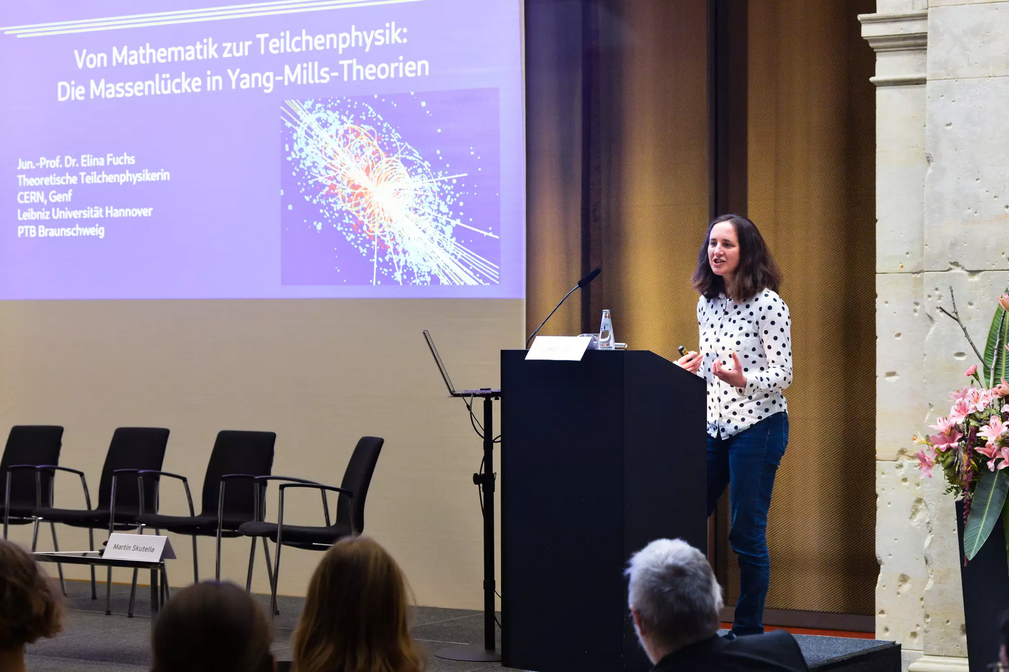
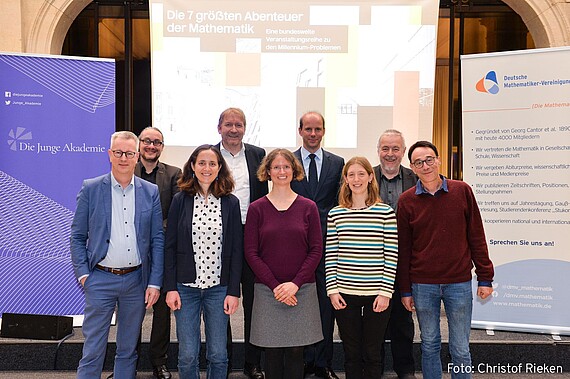
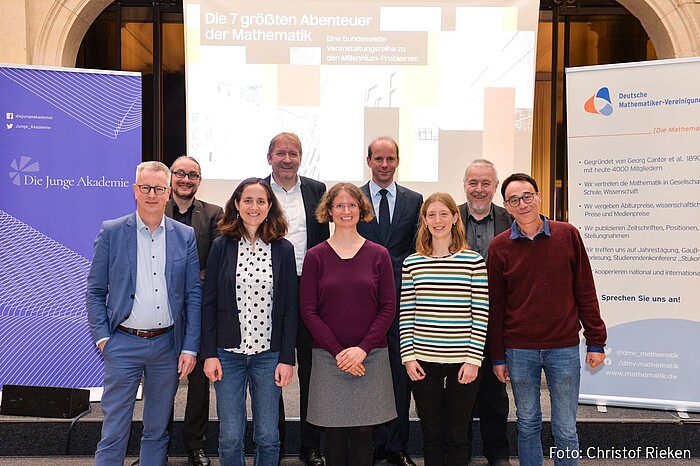
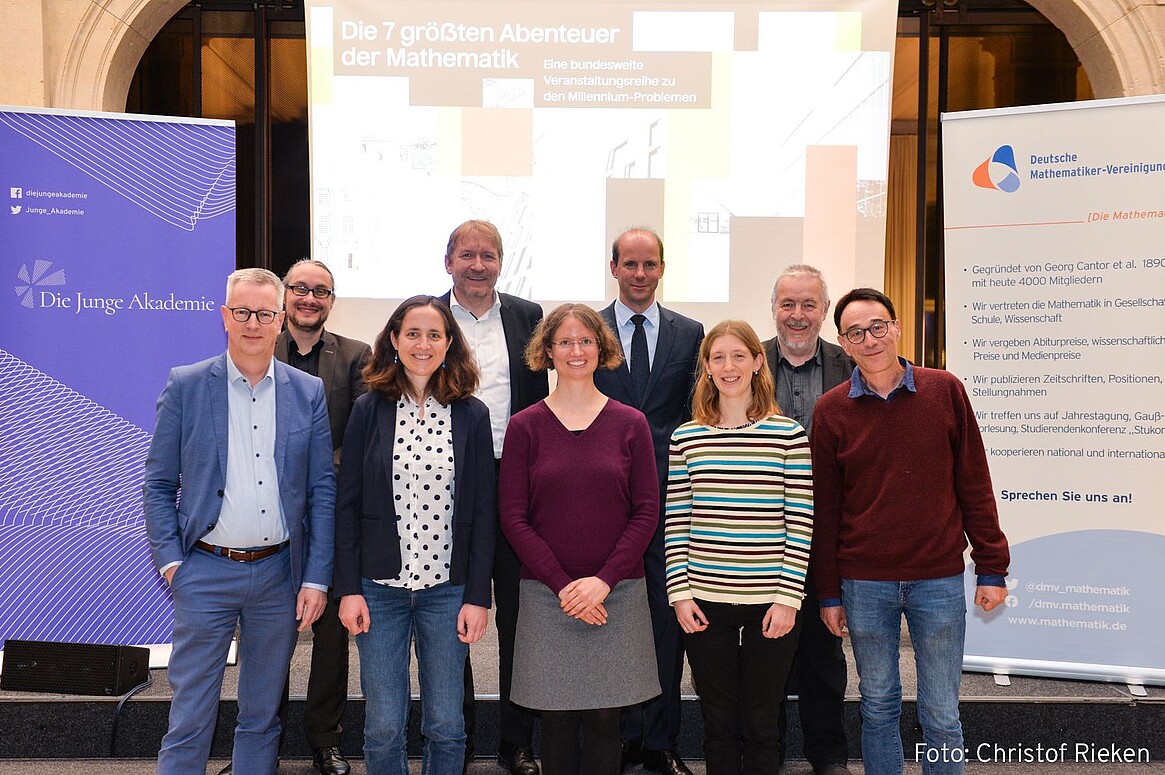
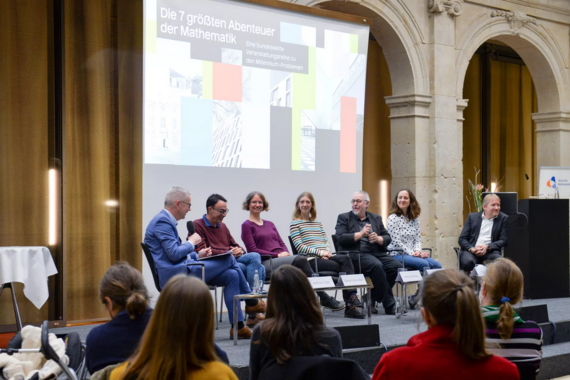
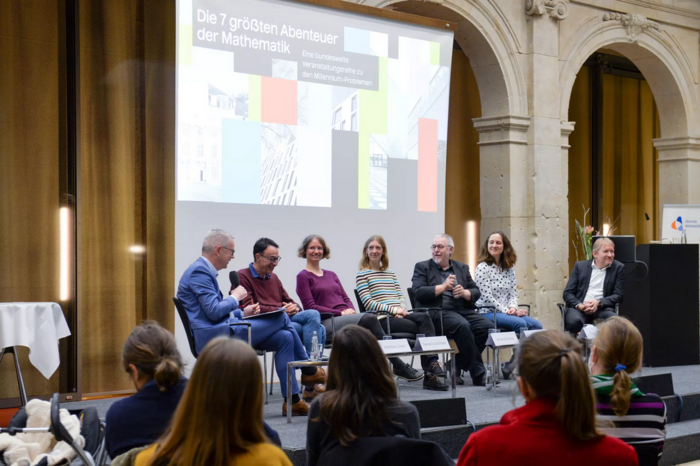
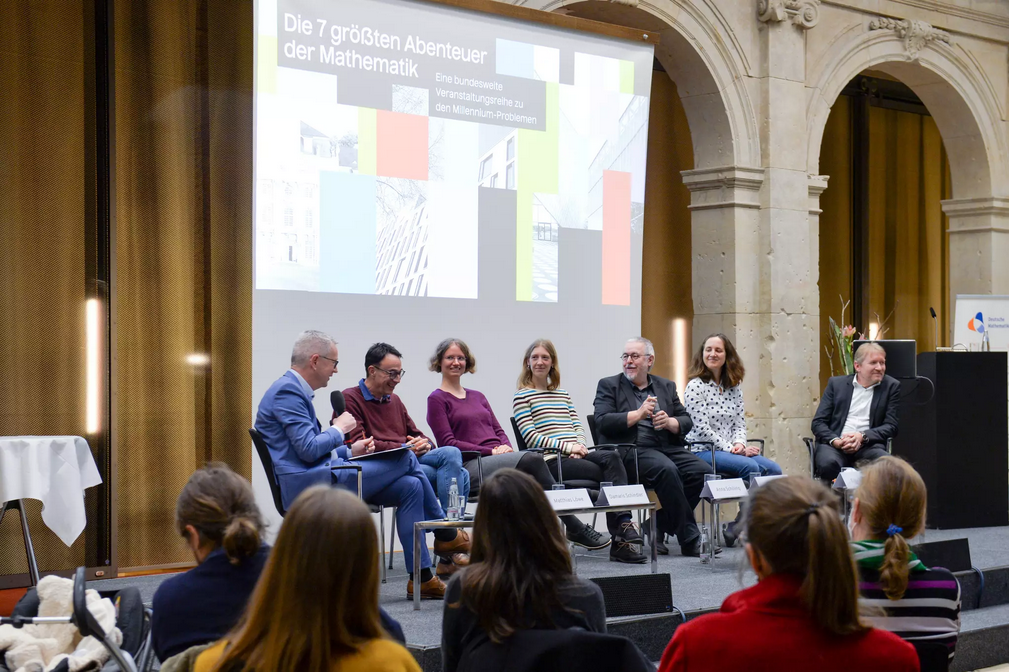
This section is under construction. More details about my outreach activities will follow.
I regularly engange in outreach activities to bring science and society closer together, to excite the next generation of researchers for scientific questions and to enhance diversity in academia by making pupils aware of their possibilities at an early age. We cannot afford to lose their talent and curiosity! Reaching an audience beyond my field and sparking the general public's interest in topics I am passionate about is always very rewarding for me. I also enjoy the often surprising and very fundamental questions by a general audience.
- 14/11/2023: I had the honor to represent the "W" for "Wissenschaft" (science) in the opening event of the KinderUni (children's university) at aufhof in the city center of Hannover - together with our Minister of Science and Culture, Falko Mohrs. We had enthusiastic particants at the age of 8 to 12 and their parents. The minister, as the patron of this 20th anniversary of the KinderUni, talked about his work as minister. The Ministry for Science and Culture (MWK) had invited 3 actors to perform a part of their current theater play for families and me to talk about particle physics and my path of becoming a junior professor. In my talk, I focused on the question how to investigate particles that are invisible to our eyes, but using the tracks they leave. In this context, it was a particular pleasure as a theorist to also perform an experiment: I showed the curious pupils the tracks of electrons, muons and alpha-particles in a cloud chamber. Many thanks to Prof. Clemens Walther from the Institute of Radio Ecology and Radiation Safety (ISR) of LUH for providing me with the equipment! The glow in the pupils' eyes, a girl's observation "Today I saw for the first time a real female physicist" and the resolution of several pupils to also become researchsers were the highlight of my week. Find out more in the TV news by Sat1 Regional and by the video produced by the MWK.
- 26/09/2023+29/09/2023: This was an exciting week with an interview for the podcast "Nachwuchsfragen" by the LUH Graduate Academy and a festive lecture at the award ceremony at the national level of the International Junior Science Olympiad in Hannover. On these occasions, I got to know new places and people from other departments and had the honor to record the podcast in the audio studio inside the library on Conti Campus and to give the lecture for very talented teenagers in the festive Kali auditorium. Thanks for the invitations to both!
- On 18/11, I had the immense pleasure to give a public evening lecture in the Berlin-Brandenburgische Akademie der Wissenschaften. My closing lecture on "Young Mills Theories: Existence and Mass Gap" took place in the outreach series "7 adventures" on the 7 millenium problems of mathematics under the patronage of the Federal Minister of Education and Research. Many thanks to the mathematicians Prof. Timo de Wolff and Prof. Sebastian Stiller and the Junge Akademie for inviting me to present a physicist's view on this mathematically unsolved problem with physics evidence. In the subsequent podium discussion with the speakers of the previous talks on the other millenium problems, moderated by Prof. Günter Ziegler (mathematician and president of the Freie Universität Berlin), we discussed the status, perspective and relevance of the 7 millenium problems (of which only one has been solved so far). Find out more on 7abenteuer.diejungeakademie.de.
- On 21/09, I had the honor to be filmed by the CERN communication & exhibitions team for the German version of explanations about Black Holes, the vacuum and tunneling effects. The result will be shown in the Science Gateway exhibition (https://sciencegateway.cern/) as "quantum animated stories" with video clips of theorists in the theory common room and -as an animation- in outer space. It was a great pleasure to spend a fraction of the working day in the CERN studio. Thanks a lot to Emma Sanders and Alexandre Cavin for the professional preparation and filming. © Photos by Emma Sanders.
- Besides these 2 examples, I have been regularly involved in outreach activities, from coordinating physics shows to guiding tours of visitors at DESY into the HERA tunnel and to synchrotron facilities, chatting with high-school students (over dinner, in and auditorium or online), giving public talks and serving in panel discussions.



















